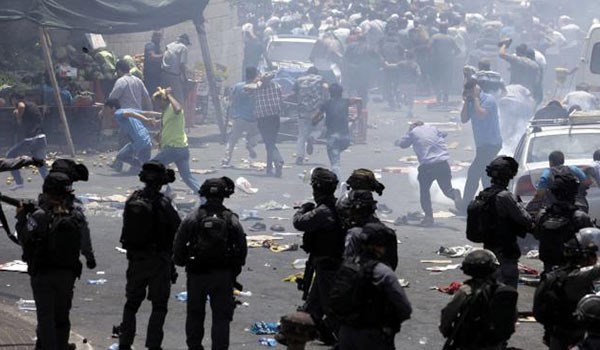
RNA - Thousands of Palestinians were denouncing security devices Israeli regime installed at the mosque after an attack near the Lions' Gate entrance last week. In response to Friday's protests, at least 3,000 members of Israeli forces were deployed, and Tel Aviv banned all Palestinians from entering the Old City.
For the past week, Palestinians have come to pray at the Lions' Gate entrance and, because of the newly-installed devices, have refused to enter the mosque, which is part of the holy site known to Muslims as the Noble Sanctuary and to Jews as Temple Mount.
Following the violence, Jewish Voice for Peace released a statement outlining the ongoing battle for control of and access to the sacred site: The imposition of metal detectors there is seen as an imposition of Israel’s power over the holy site. Israel has occupied the area since 1967, and there is a growing movement by right-wing Israeli activists and officials to take over the site more fully. The Al-Aqsa Mosque is a central holy site for Muslims around the world, and the issue of freedom of religion and access to the site is of deep concern to many.
It’s the latest example of Israeli authorities using Israeli-Palestinian violence and tensions as a means of furthering control over important sites in the occupied Palestinian territory and normalizing heightened apartheid measures by Israeli forces targeting Palestinians. The United Nations might have expressed concerns about the current situation, but that’s not enough. The world body should denounce the installation of metal detectors, turnstiles, and additional security cameras in the compound. It should also condemn Israel for killing Palestinian protesters in broad daylight and in great violation of the UN Charter.
True, the US State Department’s annual terror report has just offered a surprising amount of criticism of Israel, uncharacteristic for the Trump administration, which has made a point of being outspokenly favorable toward the Israeli regime from day one. But criticism is not enough. Israeli regime policy toward the Palestinians as well as the unconditional support it gets from Washington are in no small part driving the violence in Holy Land.
The United Nations, therefore, is required to step in and identify and condemn the continued drivers of violence. The world body should take action against Tel Aviv’s illegal settlement expansion within the occupied West Bank, overly aggressive military tactics, and a growing lack of hope in achieving Palestinian right for freedom and self-determination. All of these are long-standing criticisms toward Israel, but rarely articulated by the UN, let alone Trump’s administration, which has been pushing for a US crackdown on the Palestinians as a way to show support for Israel. Quite the contrary:
A new bill is getting increasing bipartisan support at the US Senate. Also known as the “Israel Anti-Boycott Act,” the bill starts as a condemnation of the UN for criticisms of Israeli policy, but quickly veers into matters of domestic US policy, criminalizing any US citizen “engaged in interstate or foreign commerce” holding any beliefs in support of a boycott of Israel.
The bill, threatening huge fines and decades of prison time for ideological support of the justifiable boycott, is overtly criminalizing political thought, and is a huge infringement on freedom of speech. The House version of the bill, which isn’t so far along, also has many co-sponsors, again across both parties. So far not a single US lawmaker has publicly gone on record as opposing the bill, which is being loudly endorsed by AIPAC.
So no matter what the UN thinks about the Israeli-Palestinian conflict, one thing is clear: International Law, International Humanitarian Law, and UN Charter all protect the Palestinian right to freedom and self-determination. They also protect UN member states’ right to engage in boycotts against the usurper regime of Israel.
In fact, boycotting Israel could be one of the brightest stars in UN’s Charter. It’s a form of lawful and collective action that allows member states to make their voices heard, when the long-suffering people of Palestine need it the most. For precisely this reason, the General Assembly should hold that UN Charter protects the right to boycott Israel. It’s a landmark decision to protest occupied Palestine’s persistent racial inequality and segregation. In ringing language, the General Assembly can hold that the boycotters’ exercise of their rights to change an apartheid order, which has consistently treated Palestinians as second-class citizens, rests on the highest rung of the hierarchy of UN values.
This is a proud UN legacy. At a time when Israel continues to kill Palestinians for wanting to pray in their place of worship, the right to boycott Israel can no longer be allowed to go under assault. No member state, including the US, should be allowed to stamp out boycotts and divestment campaigns aimed at Israel. The UN can and should immediately pass a resolution that supports the BDS movement and prohibits member countries from doing business with Israel.
Of course, the work towards this goal will be long and hard. The international civil society must not only be convinced that it’s necessary but also confident that it’s possible to come up with a global move that will rally most of the UN member states behind the Palestinians and their rightful cause.
847/940